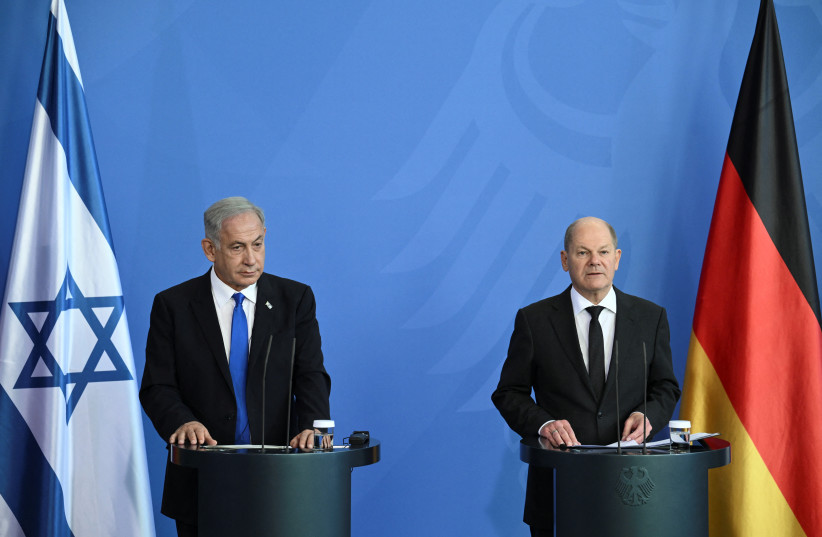Germany on Wednesday reaffirmed its commitment to Israel’s existence in an outline of national security policy.
The 39-page document, titled “Robust. Resilient. Sustainable. Integrated Security for Germany,” is meant to lay out Berlin’s policies for the coming years.
In his opening note, German Chancellor Olaf Scholz said the document is “our compass… the first in the history of our country.” It is meant, among other things, to reflect Berlin’s “path toward more security and less dependence” in the wake of Russia’s war on Ukraine, which brought Berlin’s overreliance on Moscow for energy to light.
Israel is mentioned twice in the document. First, in the executive summary, under the category of “What shapes us: Germany in the world,” it states that Germany bears a special responsibility in Europe, both as the continent’s most populous country and largest economy, as well as “in awareness of our history,” which is “why we will continue to take on responsibility for Israel’s right to exist.”
The German government expands upon this point later in the document.

“We act in awareness of our history and of the guilt our country bears for unleashing the Second World War and for perpetrating the Shoah, that betrayal of all civilized values,” it states. “Reconciliation with our European neighbors and responsibility for Israel’s right to exist remain an enduring obligation for us.”
“We act in awareness of our history and of the guilt our country bears for unleashing the WWII and for perpetrating the Shoah, that betrayal of all civilized values.”
In the section on extremism, the security strategy mentions fighting antisemitism.
The document also discusses the Iranian threat
“New forms of extremism have arisen that risk dividing our society and tipping into violence,” the document states. “They are aimed at undermining and delegitimizing democratic decision-making processes and state institutions. They often resort to conspiracy ideologies, some of them antisemitic. These anti-democratic forms of extremism also jeopardize our security.”
Regarding the Iranian threat, the security document says the Islamic Republic “is not only violating the human rights of its own citizens, but also continues to pursue its nuclear ambitions, producing ever more highly enriched fissile material, and has blocked efforts to revive the Joint Comprehensive Plan of Action of 2015.
“In addition, Iran’s missile program and its regional policy actions are fueling escalation and may give rise to new regional proliferation momentum.”
Germany, together with France and the UK, known as the E3, are the European parties to the JCPOA.
Some of Germany’s major pledges in the document include a reduction of one-sided dependencies in commodities through diversification of supply and the creation of incentives for firms to hold strategic reserves.
Germany also pledged to spend 2% of economic output, on average, on defense, according to the summary, which is a weaker pledge than the one made by Scholz days after the Russian invasion of Ukraine in a landmark speech heralding a “Zeitenwede,” or “turning of the era,” in German foreign policy.
Scholz had said Germany would from now on invest more than 2% of economic output on defense, an increase from around 1.5% currently, after years of resisting pleas from NATO allies to do so.
Reuters contributed to this report.
